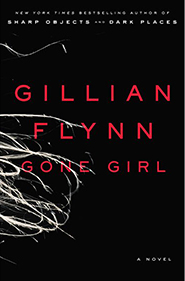by David Abrams
Buy on NOOK »As a science fiction fan coming of age in the 1980s, I cut my teeth on dystopian satires, starting with Harlan Ellison’s “‘Repent, Harlequin!’ Said the Ticktockman” then finding my way to Frederik Pohl and C.M. Kornbluth’s The Space Merchants, and a good chunk of Philip K. Dick. There was also The Handmaid’s Tale, but for today’s purposes I’m interested in the explicitly satirical vein of the dystopian genre, which I would continue to encounter in an increasingly “literary” context as I grew older—from Infinite Jest through various early George Saunders stories up to Super Sad True Love Story. Heck, if you’d suggested to me at the end of 2012 that a literary dystopia was going to make it into the Tournament of Books, I’d probably have said that I’d been impressed by Ryan Boudinot’s Blueprints of the Afterlife too, and we’d see how it fared in the competition. Miles Klee’s Ivyland had been on my radar when it came out last spring, but I hadn’t found occasion to read it until now.
The world of Ivyland is dominated by Endless Nutraceuticals, a company that controls Hallorax, an anesthetic used in a surgical procedure designed to prevent a mysterious viral infection (the actual existence of which is cast into some doubt). This surgery has become mandatory for all Americans over the age of five, so Endless is doing well for itself, and they own the New Jersey suburb of Ivyland, where much of the novel is set. Klee takes a rambling path through the story, breaking it up among multiple points of view and leaping backwards and forwards in time. At first, it was difficult to find my bearings, but I gradually figured out how most of the pieces would fit together. When somebody calls into a rush-hour radio talk show talking about how he was riding in an ice-cream truck that was shot at, soon enough you’ll be getting a first-person perspective from one of the Hallaxor-addicted shooters.
(In case you thought you caught us in a copyediting goof, Klee actually does call the anesthetic both Hallorax and Hallaxor at different points in the novel. I thought maybe I’d caught a copyediting goof, but we checked, and it’s a deliberate demonstration of how vague everybody in the Ivyland world is about the weirdly ubiquitous drug.)
There are some wonderful passages in Ivyland, like a long section narrated by Grady, a resident of a halfway house for men who’ve become developmentally disabled after an allergic reaction to Hallorax, as he wanders around Ivyland looking for his lost pet ferret, his thoughts tumbling out in rapid succession:
I runned past the creek for telling me the way back to Harvey House and look and my precious bike is sinky in the crappy brown water! All bent. All crappy. And I don’t swear like Ty but jeez is it crappy now. And the crying, like a dumb baby, but Vince was mean and criminals broke my bike and Dr. Hal is lost and Henri doesn’t play me songs or come visit even and nothing is fair, so I lie in the garbagy grass and let the cry cry.
But there are also parts that feel discordant and out of place, even within Klee’s portrait of a society falling apart at the seams. The emotional authenticity of the novel’s characters enabled me to buy into the extravagant disasters that periodically made themselves felt—the plague of caterpillars, the collapsing steel bridges—but a scene where a philosophy professor rushes across the Ivyland College campus to find his pathologically violent spouse never made it past the level of farce. (And yet, even then, one or two jagged edges fit neatly into the crannies of later chapters.)
Compared to the kaleidoscopic infrastructure of Ivyland, Gillian Flynn’s Gone Girl feels straightforward at first. Yes, it has two narrative tracks, but they’re simple counterweights: As Nick Dunne struggles to make sense of his wife Amy’s disappearance on the morning of their fifth wedding anniversary, we’re presented with extracts of the diary Amy’s been keeping since they first met. When the police and the media focus their scrutiny on Nick as the chief suspect, Amy’s portrait of their relationship becomes darker and darker. We want to accept Nick’s first-person professions of innocence, but they won’t line up with Amy’s growing sense of foreboding—what are we supposed to believe?
Then, about a third of the way through, Flynn introduces a plot twist that was like the equivalent of discovering I’d been so focused on solving one face of a Rubik’s Cube I didn’t even realize there were five other sides to the puzzle.
(It is, of course, one of those plot twists I can’t really talk about without putting up giant SPOILER ALERTS; even saying “Gone Girl is like a cross between This Film and That Film” or “I bet Gillian Flynn is a big fan of so-and-so” could reveal just a little too much.)
It took me a while to warm up to Gone Girl, because Nick comes across as a pretentious jackass at first—and so much of an overexplainer that it verges on being a flaw on Flynn’s part rather than a character trait. (When a writer feels like a character has to say, “I’m pretty sure I don’t need to say this, but…you might misconstrue, so I will,” it’s possible another round of character work might be to everyone’s advantage.) Another, more troubling problem is that some of Flynn’s initial attempts at slow-revealing are distractingly obvious:
My disposable rang in my pocket. The thing didn’t turn off right. It rang again.
“You gonna get that?” Stucks asked.
“Nah.”
“You should answer every call, man. You really should.”
It’s one thing to feel, as the story unfolds, like Nick’s not telling you something, but when he blatantly refuses to talk about that thing when it happens, when you know you’re being played, it takes some of the fun out of the mystery. At least, until Flynn reveals that letting you know you were being played was just her way of distracting you from how much she’d been playing you all along.
Even with all the structural tricks to Ivyland, I never felt anything like that disorientation, because (as I mentioned earlier) Klee establishes his connective principle early in the game. No matter what weird stuff he throws at us, we can feel confident that we’ll come to understand how it fits into the big picture. The question I’m facing now is: Does that big picture hold together as coherently as the big picture of Gone Girl?
Both novels are ridiculous in their own way, but Gone Girl has a firmer grasp on its ridiculousness; concentrating the narrative into just two voices allows Flynn to steer it with consistency and precision towards an ending that makes sense according to the ground rules that are gradually revealed. Even in its implausibility, it becomes somehow “believable.”
As good as Ivyland is, and as much as its various parts interlock with each other, it doesn’t gel in quite the same way. Many of the novel’s interior dramas work well against its minorly-apocalyptic backdrop, but then there’s stuff like the postmodernist professor and his avant-garde terrorist wife, or the occult overtones of the cabal behind Endless—even those few off-key notes were enough to snap me out of the reverie that the novel’s best passages had inspired. It’s not a question of believing that the world could end up this way; I never worried that the regimented society of the Ticktockman was a real and present danger. Yet Ellison’s short story was persistently “believable” in a way that Ivyland ultimately wasn’t for me.
That’s why, with a nod of respect to Miles Klee and an eagerness to see what he does next as a writer, I award this opening-round decision to Gillian Flynn.
Match Commentary
By Kevin Guilfoile & John Warner
Kevin: Gone Girl is a deceptively simple book. Much is made in reviews about the second- and third-act twists, and the unusual structure with its dual narrators, but the thing that really makes it work is its linearity. This is a focused and disciplined novel, and the reader feels like he is pedaling downhill from the first page.
The other really exceptional thing about it (and I don’t think Gillian Flynn has received as much attention for this as she deserves) is that the portrayal of a marriage in the first part of this book is as expertly drawn as you will find in any novel—literary or genre—this year. In fact, the thing that makes Gone Girl a “genre” book in the nomenclature of contemporary fiction is that after she paints this exquisite, photorealistic portrait of Nick and Amy’s marriage, she blows it the hell up. That is big fun for the reader, but it is also a lovely example of both instinct and craft.
Flynn lives in Chicago and our books end up in the same sections of bookstores, so inevitably we see each other now and then. (Full disclosure: I like her. She’s cool.) But I was a huge fan of her novels before we ever met. It might even have been you who insisted I read her terrific debut Sharp Objects. She’s a wonderful writer and an impossibly clever storyteller. Years ago, the first time we shared a panel at a literary festival, I introduced Flynn as someone “who writes books I wish I had written.” I meant it.
This year, as I was reading Gone Girl, I knew that I was going to have to make some changes to the novel I am currently working on. Because there were some superficial (and coincidental) similarities, yes. But mostly because it made me realize my book wasn’t good enough.
John: Of my four favorite living suspense writers, Kate Atkinson, Gillian Flynn, Megan Abbott, and Kevin Guilfoile, three are women.
I don’t know what that means, other than I thought it was interesting. Patricia Highsmith, who is no longer living, is the greatest suspense novelist of all time, also a woman.
Still don’t know what that means.
Gillian Flynn is indeed an author who had me from her first book, and for me, she improves with each one. I’d like to say I read Gone Girl before the hype, except that the book had hype before it was available to be read. It does get a lot of attention for its plot twists, which are both surprising and believable, but as you note, this book has more than that going on. It’s about things. It traffics in ideas, men and women, the way we relate and display ourselves to each other. It’s also about economic insecurity, class, status, media hype. At times it’s almost a straight-up satire.
I think the key to a good suspense novel is a rock-solid integrity between character and plot. By this I mean that the characters never do anything that seems motivated by the author as puppetmaster, as opposed to their own internal drives, and Flynn manages to achieve this for both of her main characters. As you well know, this is tough to do, and many a suspense novel falls apart when a character becomes conveniently dumb so the story can move forward. I don’t have any idea about Gillian Flynn’s writing method, but I wouldn’t be surprised if the characters come first for her.
I know this book got a lot of hype, and because of that it’s come in for “it’s not all that” backlash, but I’m in the camp that thinks the hype is well deserved.
Kevin: I’ve never read every book in the ToB, but most years I come close (this year I’ve read 12). Every year there seems to be one book that I haven’t read, and yet I can’t figure out why I hadn’t put it at the top of my TBR stack as soon as the list was announced. This year that book is Ivyland. It sounds exactly like a book I would love, and I even remember thinking that when the shortlist was announced. So why didn’t I? I don’t have a good explanation. I guess the other novels were just closer at hand. They were more readily available. That seems like an outrageous thing to say in 2013 when I could have the ebook in 30 seconds. (I generally read nonfiction on my phone or tablet, and fiction in paper form, but it’s not a strict rule with me. I read one other of this year’s contenders in ebook form.) I still want to read Ivyland. So why have I not read it?
As a novelist I am very aware of the capriciousness with which readers make decisions. There are so many books published each year, and sometimes the path between “I want to read that” and “I am now reading that” seems impassable. There are too many other books, too much good television, too many good kids to clothe and feed and build snowmen with.
Do you have any idea how many of the books on the shelves in my office are ones I have never read? An uncountable number, it seems. Every single Tuesday they publish more books I want to read. How quickly a novel like Ivyland can be forgotten in that shuffle.
I hope the ToB reminds people that Ivyland and other great books published last year are still around to be picked up and loved. And I’m going to promise Miles Klee that I will read his book. Eventually
John: I didn’t read Ivyland either, and I feel bad about it. Each year I try to make a point of reading our indie contender because I believe that there’s a lot of great books getting published by smaller presses that don’t get the attention they deserve because we spend months talking about books like Gone Girl. As a writer of a novel that didn’t get much hype, I’d like to say I’m immune to the stuff, but when there are books that lots of people are talking about, it increases my urge to read them just to see what the fuss is about. I think it also increases the chances of backlash, and it’s to Gone Girl’s credit that it seems to be holding up quite well under the additional scrutiny.
Usually the smaller-press books really are outliers in the Tournament, less conventional, more challenging, and Ivyland seems to fit the bill. There’s a big part of me that hopes our Tournament can prove that the less-hyped can compete with the big titles, except year after year they go down in the early rounds, often admired, but apparently not loved. I like to be the voice that can send some love that way, but I’ve failed in that mission this year.
We’ve both known Ron Hogan on the book scene since there was an online book scene, and he has a reputation for his Catholic tastes, so I feel good that Ivyland got its fair shake in the matchup. Gone Girl just looks like a juggernaut.
Kevin: I’ve been petitioning Andrew and Rosecrans to invite Ron Hogan to judge for several years, and I’m glad they finally did. Ron’s one of the very first book bloggers, and I actually knew him back in college. I think I was a few years ahead of him, but we had many mutual friends. If I could give a quick shout-out to his published work: Years ago Ron wrote a cool book about 1970s cinema called The Stewardess Is Flying the Plane! And last week I read this interview with the costume designer from Argo, who cited that book as one of her influences. I thought that was neat.
Tomorrow we have Jess Walter’s Beautiful Ruins taking on The Song of Achilles by Madeline Miller. And as long as we’re talking about books published long ago that you shouldn’t forget about: Confederates in the Attic by tomorrow’s judge Tony Horwitz. Really great.
























